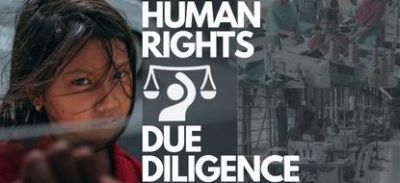Major European companies have today been named and shamed for violating human rights in other parts of the world, highlighting the need for stronger EU action on corporate responsibility.
Nestle, AB InBev and H&M are among companies headquartered in Europe whose behaviour around the world has been placed under the spotlight in the newly published ITUC Global Rights Index 2022.
“Companies are not being held to account and have, in too many cases, lost a moral compass,” according to the International Trade Union Confederation (ITUC) which compiled the report.
But the European Commission has so far only delivered the bare minimum on its promise to improve corporate responsibility, with a weak draft directive needing major improvements to be effective.
European companies violating workers’ rights across the world:
- Nestlé – Brazil: Nestle continued to use the pandemic as a pretext to slash wages and benefits. At its chocolate factory in Vila Velha in Espírito Santo, the company decided unilaterally to halve food voucher benefits from R$680 to R$350, having already reduced the share of profits passed on to workers. The cutting of food benefits first began in São Paulo, where the company has half of its workforce. In 2019, the company dismissed more than 200 workers there but had to reinstate them after a court order. But in return the unions were forced to accept an agreement that reduced employee benefits, including food vouchers.
- AB InBev – Peru: AB InBev implemented personnel restructuring processes without consulting the union organisations. In the restructuring process, the company dismissed three union general secretarie as well as fifteen workers at the northern plant in Motupe, Peru, all of whom are members of the Backus National Union on strike.
- Heinz-Glas – Peru: Heinz-Glas continued with its anti-union policy to disband the union and prevent collective bargaining. The company offered help for the disaffiliation of members, even going to their homes, sending them the letter of disaffiliation, calling them one by one to encourage their disaffiliation and offering a position with a higher income to those who would choose to disaffiliate.
- H&M – New Zealand: The H&M clothing chain suspended fourteen workers on 24 April 2021, during the negotiation of a new collective agreement on pay, in an anti-union move punishing them for trying to achieve the living wage. In 2019 already, unionised workers at H&M were locked out after wearing stickers in stores calling for fair pay.
- Santander – Brazil: Enforced a 55% pay cut on 40 bank union leaders after they made a legal challenge to be paid for overtime hours.
The cases highlight how European companies will continue to act with impunity around the world without a strong directive on due diligence.
However, as it stands, the draft directive not only fails to provide victims of rights abuses effective access to justice or sanctions which act as a deterrent to corporations, but also undermines the exercise of trade union rights enshrined in international and European human rights instruments like the ILO conventions and Council of Europe European Social Charter.
ETUC Confederal Secretary Isabelle Schömann said:
“Companies should behave abroad as they do at home. But in too many cases, big name brands believe they don’t need to comply with workers’ and trade union rights outside Europe.
“Some of Europe’s richest companies are stamping on the rights of some of the world’s poorest workers, putting their own profits before people and the planet. The leaders of the companies named in today’s report should be ashamed of themselves.
“The ETUC calls for strong EU legislation to bring those business models into line. So far, the European Commission has given into corporate lobbying and offered the bare minimum. An EU directive on corporate accountability should include workers participation in the whole due diligence process for a zero tolerance strategy against human rights violations, which ensures that victims can seek justice and companies found to have broken the law face sanctions.”
Notes
Embargoed Global Rights Index 2022
More information on the draft EU legislation on Corporate Sustainability Due Diligence

